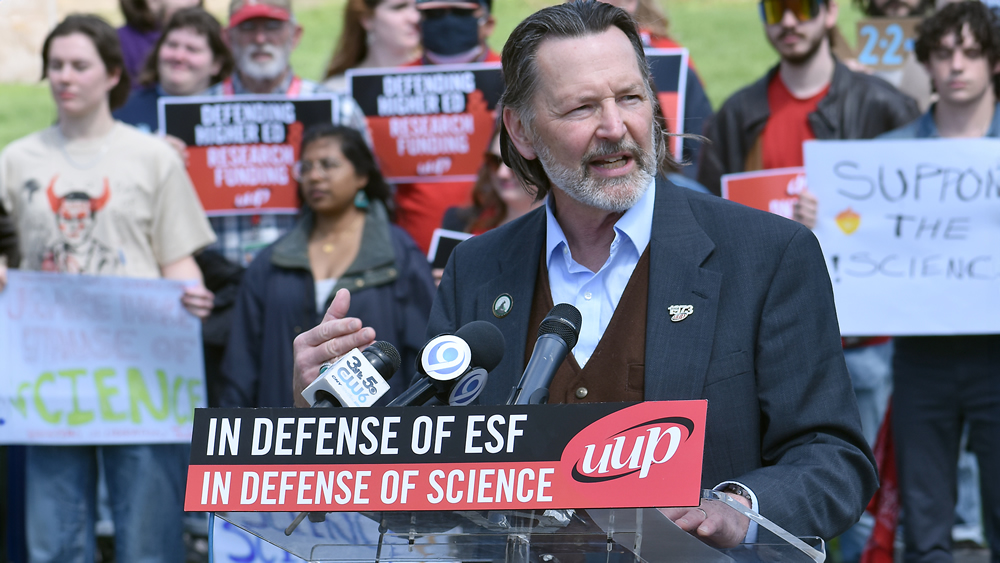April 23, 2025

A small college that packs a powerful research punch, SUNY’s College of Environmental Science and Forestry is under pressure by federal research funding cutbacks and inequities in the distribution of state operating monies—a combination that puts ESF future at risk.
That was the message delivered April 22 during an impassioned Earth Day rally by more than a dozen faculty, students and state and regional advocates. They spoke about the peril that one of the country’s preeminent environmental colleges faces as the new administration eviscerates federal research funding at the same time that the SUNY Board of Trustees continues to inequitably distribute state operating funds, so that the four University Centers get a larger proportional share than the smaller campuses.
ESF faces a $6.6 million budget deficit, an urgent problem that dates back to the coronavirus pandemic, and which the Trustees have the means to correct—but have so far refused to do so.
“Every one of us here is what helps ESF be the amazing place that it is,” UUP ESF Chapter President Matt Smith told a crowd that grew to some 500 people on the central campus quad facing the F. Franklin Moon Library. “A better world is possible—who is going to build it?”
The answer, UUP President Fred Kowal told the gathering, is that places like ESF can build a better world.
“Earth Day is every day,” Kowal said. “The work that goes on here is so central to who we can be. For too long, ESF has been forgotten by the leaders of our state and the leaders of SUNY. Now, more than ever, we need ESF. We can’t lose the work of ESF.”
UUP Statewide Vice President for Academics Alissa Karl and statewide Membership Development Officer Patrick Romain also attended the rally, as did Upstate Medical Center Chapter President Richard Veenstra, who spoke at the event in a show of support for his fellow scientists.
Grant disruptions, state funding inequities put small campuses at risk
Major universities and research hospitals, including in the SUNY system, have garnered most of the national attention about the federal administration’s actions against research grants. Small colleges like ESF, however, also hold grants derived from numerous federal agencies and entities, including the National Science Foundation, the Environmental Protection Agency and the U.S. Department of Agriculture.
Given the chaotic disruption of the grant system—which continues despite two federal court orders to halt and correct the freezes—it’s very difficult to determine the exact loss of grant dollars to any one campus, including at ESF. Reimbursements on indirect costs such as equipment purchases or hazardous waste disposal fees for laboratories have been sharply reduced, and entire grants have been stopped because their applications contain words such as “diversity,” now deemed inappropriate by the administration. Any grants that mention women’s issues or LGBTQ concerns are also immediately suspect.
Nationally, the federal funding losses to universities either because of grant disruptions, or because individual campuses have run afoul of the new administration’s halt of higher education funds approved by Congress, are believed to run in the tens of billions of dollars.
Given that the new state budget has yet to be completed, UUP continues to press the SUNY administration to more equitably distribute operating funds that the budget will grant to SUNY in a lump sum.
A college that has helped change the world—and many lives.
Both crises dominated the speakers’ remarks, as one after another described the place that ESF holds in their hearts.
“Why do we have to keep justifying ESF’s existence to Albany?” asked Jennifer Goff, an assistant professor in the Department of Chemistry. “This is the kind of institution that should make policymakers in Albany proud. Here is where our next generation of environmental scientists get their boots muddied. Yes, ESF is small, but it punches so much higher than its weight, and it’s time they treated us that way.”
“Coming to ESF in a time of global and national contention made me into a person I did not expect to become,” said graduate student Jenelle Booker, who called the dual pressures of the federal crackdown on grants and the SUNY refusal to properly fund ESF “an intentional destabilization of the academic institution.”
Other speakers included ESF professors Andrea Feldpausch-Parker, Robert Malmsheimer and Colin Beier; Sue Fassler, ESF Director of Sustainability and co-chair of UUP’s statewide Environmental Advocacy and Issues Committee; Neil Patterson Jr., executive director of the ESF Center for the Native Peoples and the Environment; Eden Gardner, the Student Assembly President; Ann Marie Taliercio, president of the Central New York Area Labor Federation, AFL-CIO; and Syracuse City Auditor Alexander Marion.

